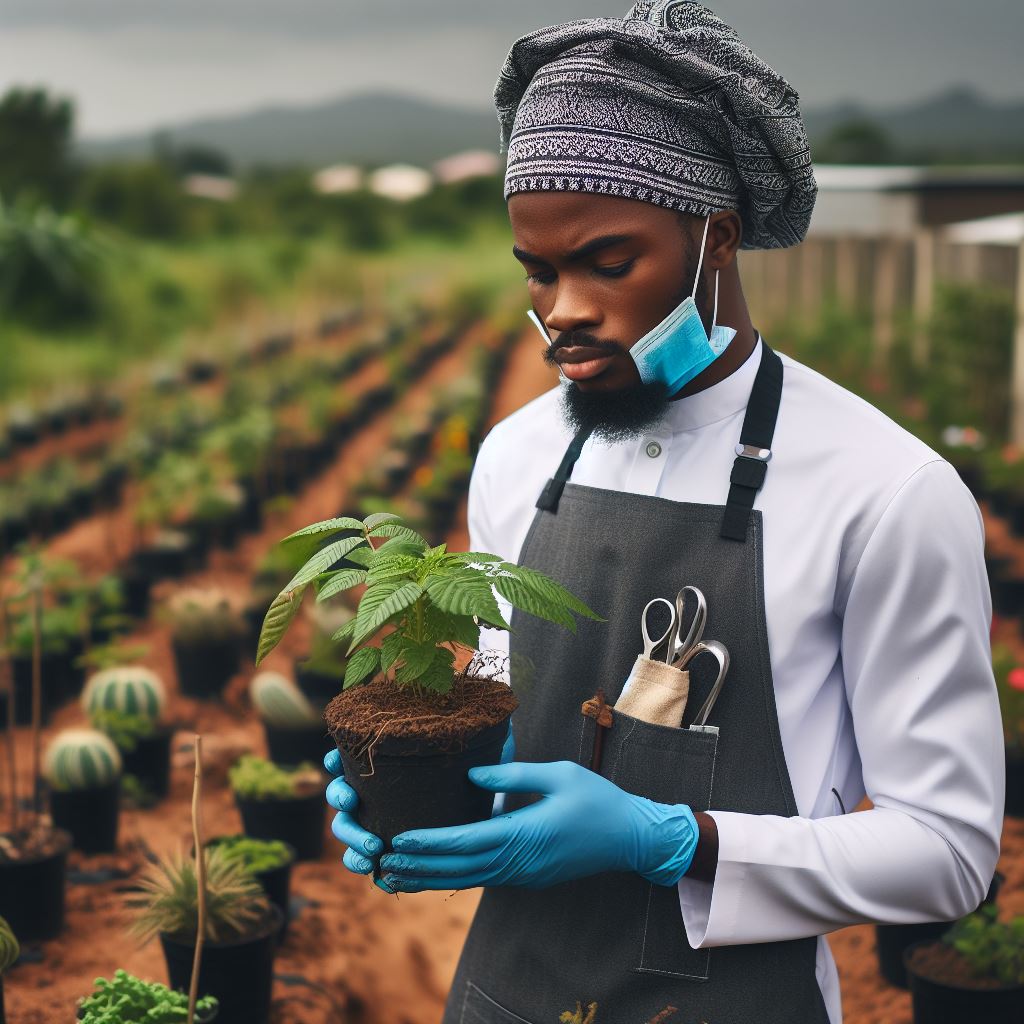Introduction
Urban gardening and horticulture are thriving in Lagos, transforming the bustling cityscape into pockets of green oases.
These urban gardens play a crucial role in densely populated cities, offering numerous benefits such as improved air quality, enhanced food security, and fostering community engagement.
In a city as vibrant and congested as Lagos, the presence of green spaces brings a breath of fresh air and a touch of nature to urban living.
Importance of Urban Gardens
Urban gardens significantly enhance air quality by reducing pollution and increasing oxygen levels.
They provide fresh, locally grown produce, contributing to food security and reducing dependence on imported goods.
Moreover, urban gardens foster a sense of community by bringing people together, offering recreational spaces, and promoting healthier lifestyles.
Key Points Discussed
This blog post will explore:
- Benefits of Urban Gardening in Lagos: How urban gardens improve air quality, food security, and community well-being.
- Challenges Faced by Urban Gardeners: Issues like limited space, resource constraints, and urban planning obstacles.
- Successful Urban Gardening Initiatives: Examples of thriving urban gardens and community projects in Lagos.
- Tips for Starting Your Own Urban Garden: Practical advice and steps to create and maintain a garden in the city.
Urban gardening in Lagos is not just a trend but a necessity for sustainable urban living. Let’s dive into how these green spaces are transforming the city and how you can get involved in this green movement.
The Growth of Urban Gardens in Lagos
History of Urban Gardening in Lagos
Urban gardening in Lagos has a long history dating back to the colonial era when residents started growing vegetables in small plots around their homes. This practice was initially for sustenance but has evolved over the years.
Factors Contributing to the Growth of Urban Gardens in the City
Several factors have contributed to the growth of urban gardens in Lagos. The increasing population density and limited access to fresh produce are key drivers.
Additionally, rising awareness of health and environmental benefits of urban gardening has spurred interest in cultivating gardens in the city.
Types of Urban Gardens That Are Popular in Lagos
- Community Gardens: These are shared spaces where residents come together to cultivate crops collectively. Community gardens promote social interaction and food security within neighborhoods.
- Roof-Top Gardens: Due to limited land space in Lagos, many urban dwellers have turned to roof-top gardening. It involves growing plants on the roofs of buildings, providing a sustainable solution for fresh produce.
- Balcony Gardens: Residents without access to a backyard or community garden often opt for balcony gardens. These gardens utilize vertical space efficiently, allowing individuals to grow herbs, vegetables, and even flowers in pots or containers.
- Vertical Gardens: Vertical gardens are gaining popularity in Lagos due to their space-saving design. These gardens are created on walls or other vertical structures, maximizing greenery in urban areas.
- Container Gardens: Container gardening involves growing plants in pots or containers, making it ideal for urban spaces with limited soil. This method allows individuals to cultivate a variety of crops, even in small apartments or balconies.
In short, the growth of urban gardens in Lagos reflects a shift towards sustainable living practices and a desire for community engagement. These gardens not only provide fresh produce but also contribute to urban greening and environmental conservation in the city.
Read: Traditional vs Modern Horticulture in Nigeria
Challenges Faced by Urban Gardeners in Lagos
When it comes to urban gardening in Lagos, there are various challenges that gardeners face on a daily basis.
These challenges often hinder the growth and development of urban gardens in the city. Here are some of the key challenges faced by urban gardeners in Lagos:
Limited Space and Land Availability
One of the primary challenges faced by urban gardeners in Lagos is the limited space and land availability for gardening. With the rapid urbanization and population growth in the city, finding suitable land or space for gardening can be a major challenge.
Lack of Access to Affordable Gardening Supplies
Another challenge that urban gardeners in Lagos face is the lack of access to affordable gardening supplies. Gardening tools, seeds, fertilizers, and other supplies can be expensive and hard to come by, making it difficult for gardeners to maintain their gardens.
Pollution and Environmental Concerns
Pollution and environmental concerns are also significant challenges for urban gardeners in Lagos. Air pollution, water contamination, and soil pollution can have a negative impact on the health of plants and the overall success of urban gardens.
Government Regulations and Policies Affecting Urban Gardening
Government regulations and policies can also present challenges for urban gardeners in Lagos.
Zoning regulations, land use policies, and licensing requirements can limit where and how urban gardens can operate, making it difficult for gardeners to establish and maintain their gardens.
In fact, urban gardeners in Lagos face a multitude of challenges that can impact the success and sustainability of their gardens.
Addressing these challenges will require collaboration between gardeners, policymakers, and other stakeholders to create a more conducive environment for urban gardening in the city.
Read: Horticulture and Food Security in Nigeria
Benefits of Urban Gardens and Horticulture in Lagos
Urban gardening and horticulture in Lagos offer numerous benefits to the community, environment, and individual well-being.
Improving food security and access to fresh produce
Urban gardens provide a source of fresh fruits and vegetables that may not be readily available in local markets.
Residents can supplement their diets with nutritious produce grown in their neighborhoods, reducing their reliance on processed foods.
This increased access to fresh food helps address food insecurity issues, especially in low-income areas where access to quality produce is limited.
Promoting community engagement and social cohesion
Urban gardens serve as a gathering place for residents to connect with their neighbors, share gardening tips, and build friendships.
Community gardening projects encourage collaboration and teamwork, fostering a sense of unity and solidarity among residents.
These shared spaces promote social interaction, reduce isolation, and strengthen the fabric of the community.
Enhancing urban biodiversity and environmental sustainability
Urban gardens contribute to the preservation of local plant species and provide habitats for beneficial insects and pollinators.
Green spaces in urban areas help mitigate the heat island effect, improve air quality, and reduce stormwater runoff.
By integrating gardens into the urban landscape, cities like Lagos can enhance their environmental sustainability and resilience to climate change.
Contributing to a healthier lifestyle and well-being for residents
Gardening has been proven to have numerous health benefits, including stress reduction, physical activity, and mental well-being.
Residents who participate in urban gardening activities are more likely to engage in outdoor exercise and adopt healthier eating habits.
Connecting with nature in an urban environment can improve mood, decrease anxiety, and promote overall wellness among residents.
To summarize, urban gardens and horticulture play a vital role in enhancing the quality of life in Lagos by improving food security, promoting community engagement, enhancing biodiversity, and contributing to a healthier lifestyle for residents.
These initiatives not only benefit individuals but also have a positive impact on the environment and the community as a whole.
Read: Innovations in Nigerian Horticulture

Success Stories and Case Studies
Successful urban gardening initiatives in Lagos
- The Floating School Garden in Makoko, a community-led project growing fresh produce.
- The Rooftop Gardens at the Lagos City Mall, providing organic vegetables for local residents.
- The Green Thumb Project in Yaba, empowering youth through horticulture skills training.
Showcase innovative horticulture projects that have made a positive impact
- The Mobile Garden Truck, bringing gardening workshops and tools to underserved neighborhoods.
- The Vertical Farming initiative in Victoria Island, maximizing space and efficiency for fresh food production.
- The Community Garden in Lekki, fostering a sense of community and sustainability through shared gardening.
How these success stories can inspire and motivate more people to start their own urban gardens
- By seeing tangible examples of successful urban gardening projects, individuals are more likely to take action.
- The positive impacts of these initiatives demonstrate the potential for urban gardens to improve communities.
- Sharing these stories through social media and community events can spark interest and participation in urban gardening.
Read: Hydroponics in Nigerian Horticulture
Conclusion
Urban gardens and horticulture play a vital role in enhancing the quality of life in Lagos.
They improve air quality, bolster food security, and strengthen community ties. These green spaces are essential for creating a sustainable and healthy urban environment.
I encourage you to get involved in urban gardening and support local initiatives. By participating, you contribute to a greener, healthier, and more connected city.
To help you get started, here are some resources and tips
- Start Small: Begin with container gardening on your balcony or terrace.
- Join a Community Garden: Connect with local groups to share knowledge and resources.
- Use Recycled Materials: Employ eco-friendly practices by using recycled containers and composting organic waste.
- Choose Native Plants: Select plants suited to the local climate to ensure better growth and sustainability.
- Learn and Experiment: Continuously educate yourself through workshops and online resources.
Urban gardening can transform our city and our lives. Let’s make Lagos greener together.




